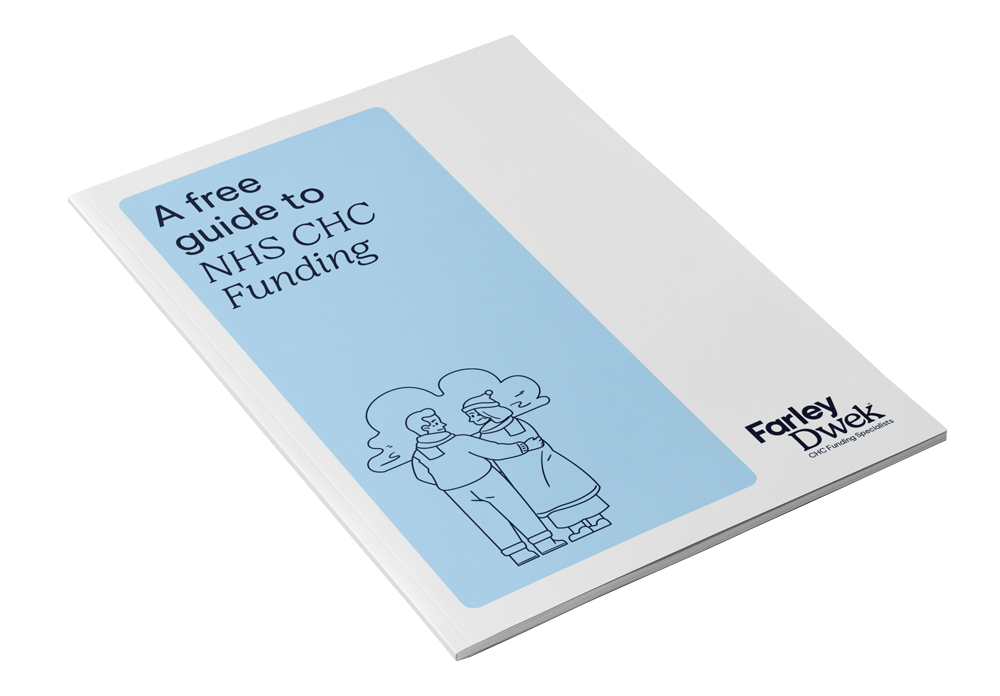What is an ICB and What Is Its Role in CHC Funding?
Integrated Care Boards, or ICBs, are a key part of the NHS structure in England, playing a central role in NHS Continuing Healthcare (CHC) funding. Whether you are applying for funding for the first time or appealing a decision, understanding what an ICB is, how it operates and its role in approving CHC packages can make a real difference to the outcome.
In this article, we discuss:
- What is an ICB?
- What is the ICB’s role in CHC funding?
- Who is your local ICB?
- Secure CHC funding
What is an ICB?
An Integrated Care Board is the statutory NHS organisation responsible for planning, commissioning and overseeing NHS services in its area. ICBs replaced clinical commissioning groups (CCGs) in July 2022 as part of a wider shift to integrated care systems (ICSs).
ICSs aim to join up health and social care for a local population so that NHS services work more closely with local authorities, voluntary organisations and community partners.
Each ICB covers a defined region and works with other health and care organisations to plan services and manage the NHS budget locally. They also collaborate with Integrated Care Partnerships (ICPs) to support broader social and economic development, looking beyond direct medical treatment to the wider factors that influence health, such as housing, employment and education.
ICBs aim to ensure health and care services are accessible and meet the health needs of local people through integrating planning and decision-making. This includes tackling inequalities and making sure public money is used where it will have the greatest impact.
What is the ICB’s role in CHC funding?
The ICB is responsible for assessing, commissioning and funding CHC packages in your local area. When it comes to determining eligibility, the ICB is the ultimate decision-maker, although it should take account of the Local Authority’s view. As the NHS body responsible for commissioning health services in its area, the ICB has the legal duty to decide whether you have a primary health need and, if so, to arrange and fund your care. This is sometimes referred to as the ICB CHC function.
Once your CHC assessment is complete, the Multi-Disciplinary Team (MDT) will make a recommendation to the ICB, using the Decision Support Tool. The tool assists the MDT in applying the eligibility criteria, in line with the National Framework for NHS Continuing Healthcare. The ICB will review MDT’s recommendation and verify the decision. In all but exceptional circumstances, the ICB should uphold the recommendation of the MDT. If the ICB does not agree with the recommendation, it should ask the MDT to undertake further work to demonstrate why its recommendation is correct.
If you are found to meet the criteria for CHC funding, the ICB will put together a personalised package of care to meet your assessed needs, which could be delivered at home, in a nursing home or through other appropriate services. The ICB must work with local providers to ensure the package is safe, sustainable and fully funded by the NHS.
If you disagree with the ICB’s decision, you do have the right to appeal. This process is also run locally and, in many cases, professional representation can help strengthen your case, particularly if you use a service such as our CHC Appeals Representation Service.
Who is your local ICB?
There are 42 ICBs in England, each linked to an integrated care system. You can find your local board on the NHS website – Find your local ICB.
Your local ICB will be responsible for arranging your CHC assessment. This typically begins with a screening Checklist, followed by a full assessment if you meet the threshold. The process may involve working with local authority teams, NHS clinicians and voluntary sector partners to gather a full picture of your needs.
Because ICBs work with local councils and community services, processes may vary slightly between areas, but understanding your board’s procedures – and how it partners with local government, the voluntary sector, and NHS providers – can help you prepare for meetings and ensure the right evidence is presented.
Secure CHC funding
Farley Dwek support clients through every stage of the process, to ensure you’re fully prepared for your ICB meeting.
Find out more about our range of services or explore our Continuing Healthcare guidance to see how we can help you secure the funding you’re entitled to.
FAQs
ICB stands for Integrated Care Board – the statutory NHS body that commissions and funds healthcare for its region.
ICBs replaced clinical commissioning groups (CCGs) in July 2022.
While CCGs were focused mainly on commissioning NHS services, ICBs have a wider role within integrated care systems (ICSs), bringing together NHS organisations, local government and the voluntary sector to join up health and social care, meet the health needs of the population and address the wider causes of illness.
There are 42 Integrated Care Boards, each aligned to an ICS. They cover the whole of England, i.e. Greater Manchester, Cheshire and Merseyside, North East and North Cumbria, and Kent and Medway. You can see the full list on the NHS England site.
Yes. ICBs are statutory NHS bodies and have been accountable to NHS England. However, as NHS England has been abolished (as of March 2025) ICBs will be restructured under the new arrangements for managing NHS services.
ICBs are not being entirely abolished, but their structure and responsibilities will change, with the aim of streamlining decision-making and improving integration between NHS and social care services, while retaining the local commissioning role of ICBs.



